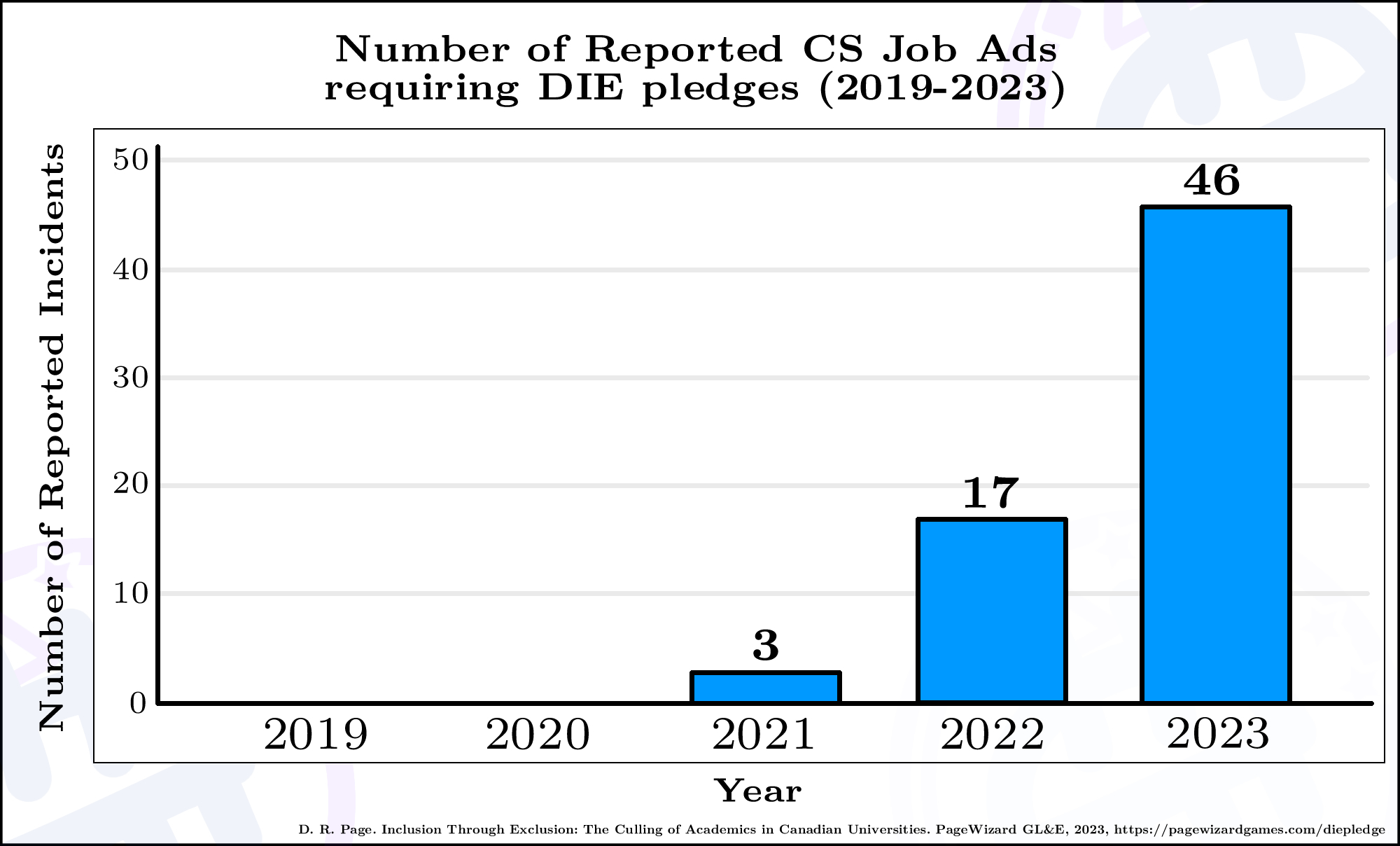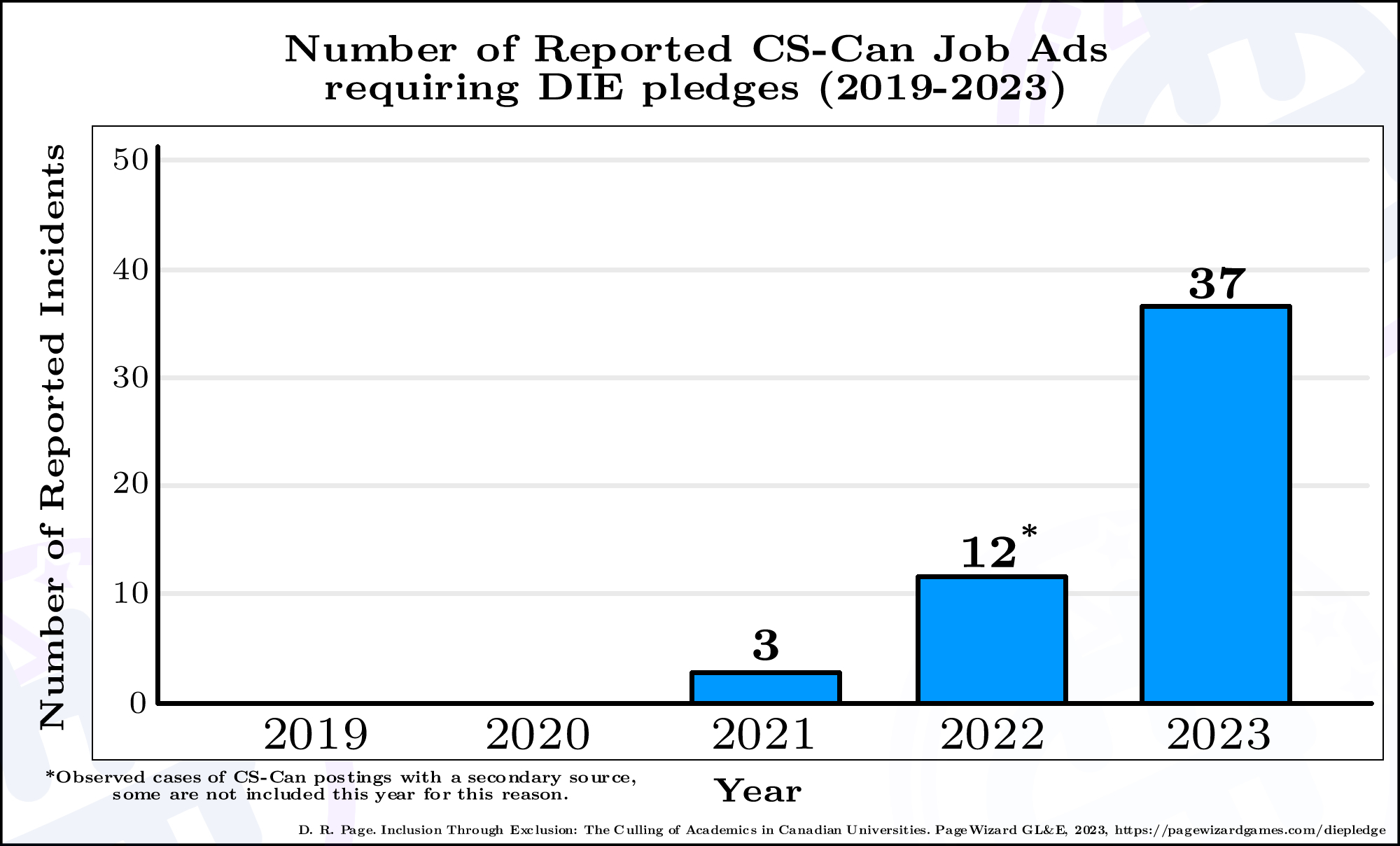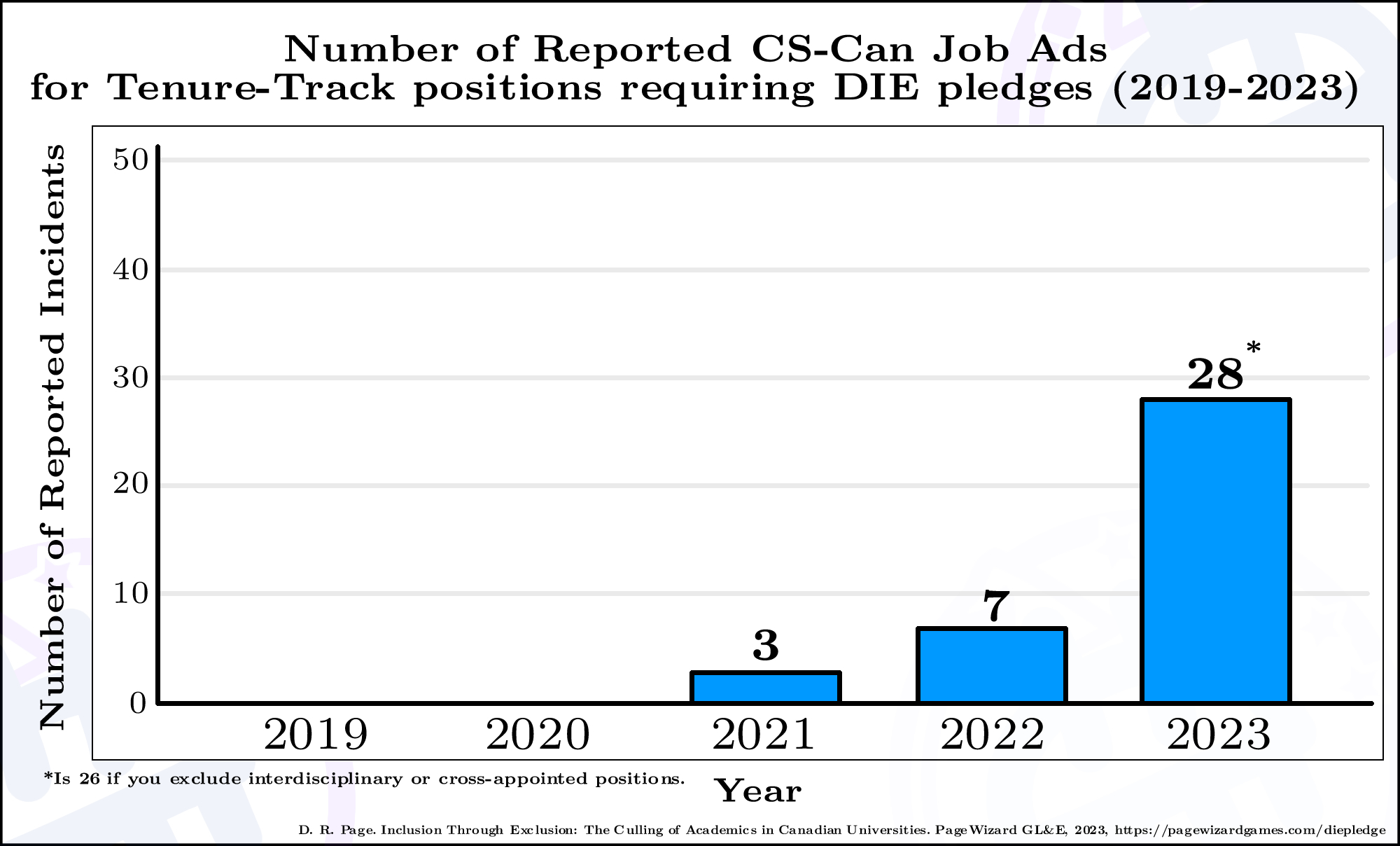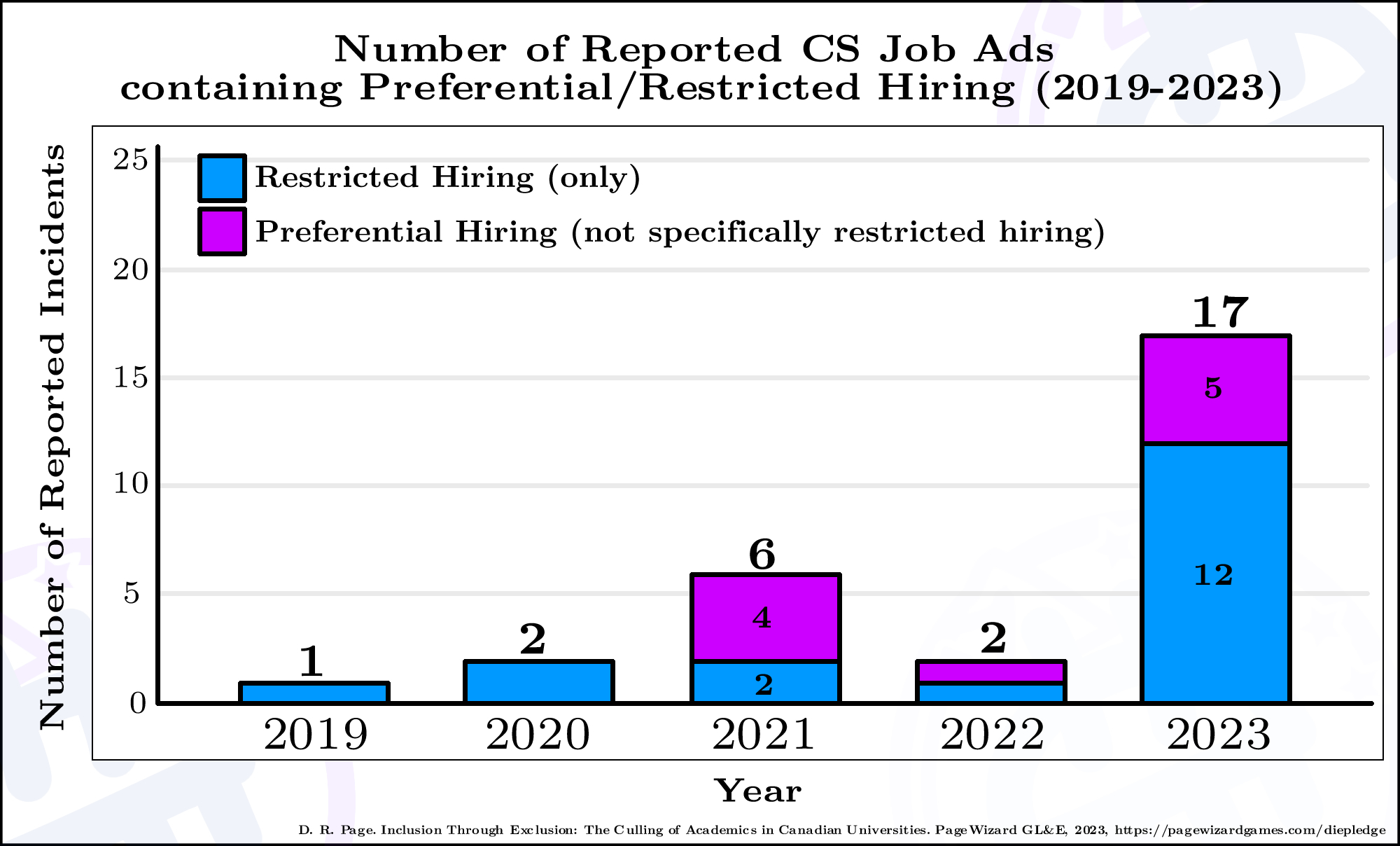Inclusion Through Exclusion
THE CULLING OF ACADEMICS IN CANADIAN
UNIVERSITIES
We explore the issue of exclusion in academic institutions in Canada, with a focus on Computer Science. Academic culling in our research is the active (intentional or unintentional) removing of plurality from universities through requiring compelled speech, or placing (new) barriers to academic appointments to serve ideological/political/religious purposes [in this case, so-called "diversity, inclusion, and equity" (DIE)]. Namely, we study a (new) practice that discriminates against academics that do not value or wish to pursue goals of DIE, or academics that abstain on the basis of academic principles/standards.
Our interest in this topic largely came as a result of observing incongruities in our professional experiences in inclusion and those of DIE. There are many grounded and reasoned ways one may disagree with DIE and its methods; whether one agrees or disagrees with DIE, a concerning trend has grown in public Canadian universities of overstepping the boundary of respecting the intellectual autonomy of academics. Have our public universities focused so hard on identity and related political/ideological pursuits, that they have an identity crisis? What does this mean for the next generation of students, our academics, and the future of scientific research in Canada?
If you are here, you likely have heard the above phrase before. For those unfamiliar with DIE: "Woke in Plain English" by Peter Boghossian
We focus on what we call DIE pledges, a term for requiring applicants or academics more broadly give their commitment to DIE in some form: As a job requirement, a statement, or, to participate as an activist. Fundamentally, like other ideological pledges built on non-academic requirements (or even anti-academic requirements, as in this case), pledges such as these are an afront to intellectual autonomy of academics and violate the merit principle.
The following is a preliminary investigation based on our 5+ year study of this topic. We monitored job advertisements posted on CS-Can and other Canadian institutions, that may require a Computer Science PhD. The primary focus was monitoring CS-Can, where job advertisements for faculty positions in Computer Science Departments in Canada are regularly posted. Concerning increases in these practices have occurred.
To the best of our knowledge, our work is the first attempt to document/report this in Canadian STEM fields.
Essay on concerns around DIE pledges (by Mark Mercer, Professor of Philosopher and Past President of The Society for Academic Freedom and Scholarship (2013-2023)): "Swear Allegiance to Equity, Diversity, and Inclusion or Don't Get Hired"
We thank The Society for Academic Freedom and Scholarship (SAFS) for archiving many of the incidents we reported in this academic research.
Some other resources on related matters:
- "The Parasitic Mind: How Infectious Ideas Are Killing Common Sense" by Saad (2020) [Approachable read]
- "Cynical Theories: How Activist Scholarship Made Everything about Race, Gender, and Identity―and Why This Harms Everybody" by Pluckrose & Lindsay (2020)
- "The Coddling of the American Mind: How Good Intentions and Bad Ideas Are Setting Up a Generation for Failure" by Haidt and Lukianoff (2018) [Excellent resource for parents]
- "The Canceling of the American Mind: Cancel Culture Undermines Trust and Threatens Us All—But There Is a Solution" by Lukianoff and Schlott (2023)
- "Jamie Sarkonak: Canadian universities using DEI statements to force conformity of thought" by Jamie Sarkonak (National Post, 2023)
- "Patanjali Kambhampati: My 'lived experience' tells me that diversity, inclusion and equity is antithetical to human liberty" by Patanjali Kambhampati (National Post, 2022)
- "The State of Academic Freedom in Canada" by Daniel Page (PageWizard GL&E, 2023)
Click Here For the Slides of the Academic Presentation
Preliminary Data Presented in Talk for Reported Incidents of Computer Science Academic Advertisements in Canada (as of December 12, 2023):
Reported DIE Pledges: CSV, TSV | Reported Restricted/Preferential Hiring: CSV, TSV
Incidents of DIE Pledges and Restricted/Preferential Hiring are occurring more often than before in Computer Science academic job advertisements. You can click on each chart to view it in a new tab.
Definitions:
- Preferential Hiring: Hiring where all qualified applicants can apply, but preference will be given to applicants if they belong to a preferred group, specified by a non-academic qualification.
- Restricted Hiring: Hiring where all applicants must belong to a preferred group, specified by a non-academic qualification.
- DIE pledge: The requirement or expectation of an applicant to give/present a commitment to DIE, taking at least one of the following three forms:
- Job requirement is to be committed to DIE.
- Requiring a statement about DIE, often called a diversity statement or EDI statement.
- The position is itself as a DIE activist to some extent, including promotion or advocacy supporting DIE.
Total job advertisements documented, requiring DIE pledges:
Of those job ads that were posted on CS-Can for the period, below are the frequencies of reported ads requiring DIE pledges:
Of the documented observed CS-Can ads for the period, below are the frequencies of reported ads for tenure-track positions (includes Canada Research Chair), requiring DIE pledges:
Documented/reported incidents of preferential/restricted hiring (overall):
By the nature of our research, it is based on reported/documented cases; the data set is technically incomplete. If you know of more CS academic positions (and have documentation of them), you may let us know here using the following form to help us document more incidents: https://forms.gle/pJQhCB3MhpTRwfsq6
In addition to the above preliminary results, we conclude that:
- At least 75% of Maclean's Canada’s Best Computer Science Programs 2024 List has engaged in some of these exclusionary practices.
- At least 80% of the U15 universities has engaged in some of these exclusionary practices.
For academic questions, or if there are any typos to report: drpage@pagewizardgames.com
If the preliminary data set is cited, please refer to this page by its title or cite the preliminary data set as, per appropriate format:
Page, D.R., Preliminary Data Set Reporting Preferential Hiring and DIE pledges in Canadian Computer Science Academic Job Advertisements. PageWizard Games, Learning & Entertainment. 2023. https://pagewizardgames.com/diepledge/



